As You Write, So You Are
August 21, 2013
As a child of the
sixties, I was immersed in many of that decade's
cultural movements, the
slogan of one being, "you are what you eat." Most of the
country didn't buy into that "
hippie"
paradigm, and it was simultaneously torpedoed by the
food industry, which annually added new
ingredients to every
prepared food item. After all, who would want to buy a
cookie without
propylene glycol?
You're not only what you eat, you're also what are what you say. Fortunately, I was born in a region of
Upstate New York where the people spoke essentially
unaccented English. Some
educated people from the
New York metropolitan area have been forced to spend considerable time and money to rid themselves of its heavy regional accent. One of our
secretaries had an endearing way of saying "
coffee," but her accent would have prevented her from getting a job at a
television anchor desk.
Nowadays, the
written word is as important as the
spoken word, because everyone is accessing
social media, and some are writing
blogs. As a consequence, you're also what you write. What people write in the aggregate can be analyzed by the
Google Ngram Viewer, which allows an examination of the
frequency of occurrence of words as a function of time for the many books and other publications that Google has indexed.[1-4] I've written about the Ngram Viewer in a few previous articles:
• Culturomics, January 13, 2011
• Physics Top Fifty, July 19, 2011
• Word Extinction, August 17, 2011
• Modeling Scientific Citation, December 16, 2011
• Plotting Emotions.April 10, 2013
The Ngram Viewer is being used in research to identify
trends. These trends are necessarily long-term, since the
data run over the course of many decades and end in 2000. In this case, we work with a
converse principle, "as you write, so you are." A recent
paper by
UCLA psychologist,
Patricia M. Greenfield, in the
journal,
Psychological Science, uses the Ngram Viewer to quantify the rise in
individualism, at least among writers of the
English language. Surprisingly, the trend towards "me" from "us" is not recent. It's been progressing in the same time frame as
urbanization.[5-8]
The Ngram data of the
time evolution of such words as
give,
get,
obliged,
choose,
individual and
obedience, show the trend away from
community and towards the individual. From the article abstract,
"Adaptation to rural environments prioritizes social obligation and duty, giving to other people, social belonging, religion in everyday life, authority relations, and physical activity. Adaptation to urban environments requires more individualistic and materialistic values; such adaptation prioritizes choice, personal possessions, and child-centered socialization in order to foster the development of psychological mindedness and the unique self."[5]
Says Greenfield, "The currently discussed rise in individualism is not something recent but has been going on for centuries as we moved from a predominantly rural,
low-tech society to a predominantly urban,
high-tech society."[7] Greenfield's
theory is that obligation and respect for authority are better for a person's interests in rural environments, whereas individualism and
materialism work best in cities.[8] Greenfield's study looked at about 1.5 million English-language books published between 1800 and 2000, about 1,160,000 of which were published in the
United States.[6-7]
Greenfield found the anticipated decline and rise in the use of certain words, but with a few exceptions; for example, the use of the word, "get," declined between
1940 and the 1960s before rising again in the
1970s. This seems to define a decline in self-interest caused by
World War II and the
US civil rights movement.[6-7] Notes Greenfield,
“The Google Ngram Viewer is a revolutionary tool in that it counts word frequencies in a million books in less than a second. Not only that, it's a publicly accessible tool. Anyone can go to the Google Ngram website and replicate all of my results!”[6]
As an illustration of this easy
reproducibility, I present my own Ngram graphs for the words,
give,
get,
obliged,
choose,
obedience and
individual. My raw data is available as a
CSV file,
here.
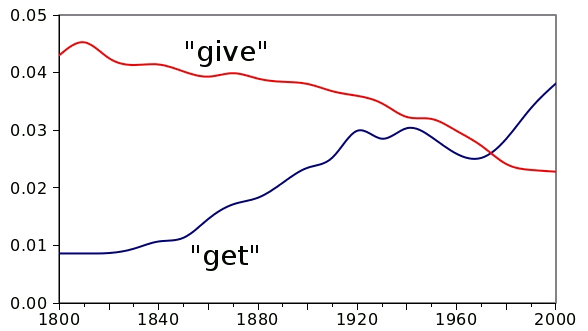
Frequency of use as a percentage of all words for give and get. (Data from Google Ngram Viewer, plotted using Gnumeric.)
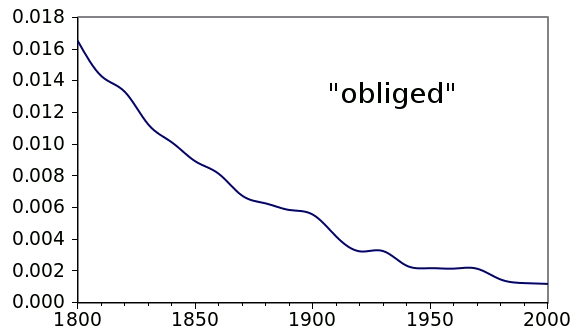
Frequency of use as a percentage of all words for obliged. (Data from Google Ngram Viewer, plotted using Gnumeric.)
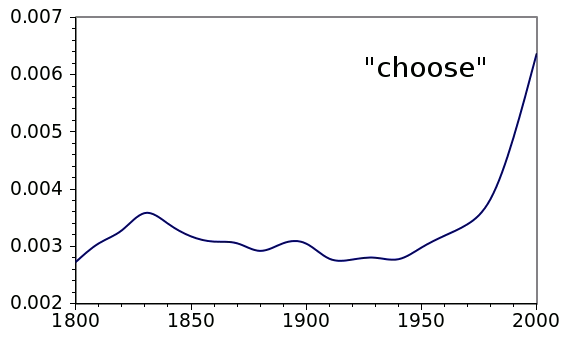
Frequency of use as a percentage of all words for choose. (Data from Google Ngram Viewer, plotted using Gnumeric.)
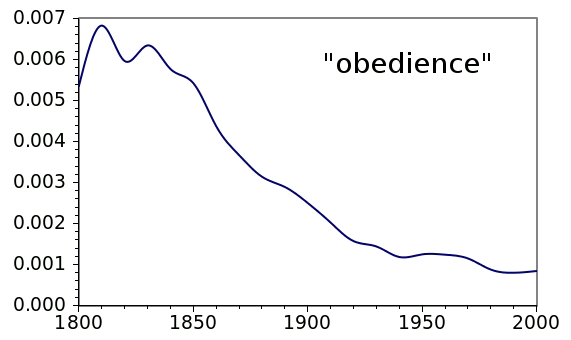
Frequency of use as a percentage of all words for obedience. (Data from Google Ngram Viewer, plotted using Gnumeric.)
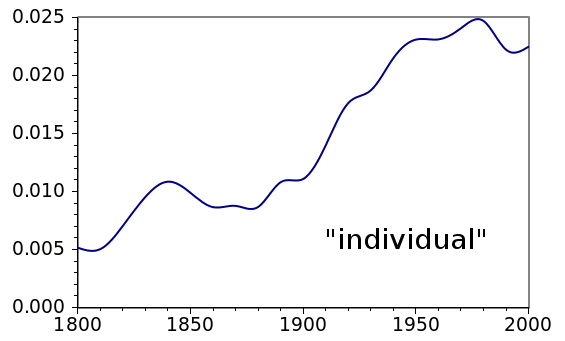
Frequency of use as a percentage of all words for individual. (Data from Google Ngram Viewer, plotted using Gnumeric.)
Greenfield plans to examine these same trends using the Ngram
Spanish,
French,
Russian, and
Chinese databases.[6-7] It will be interesting to see how global the trends are. One word that's had a recent rise in popularity is "feel," which has had an upwards trend only since
1965, as illustrated in my final graph.
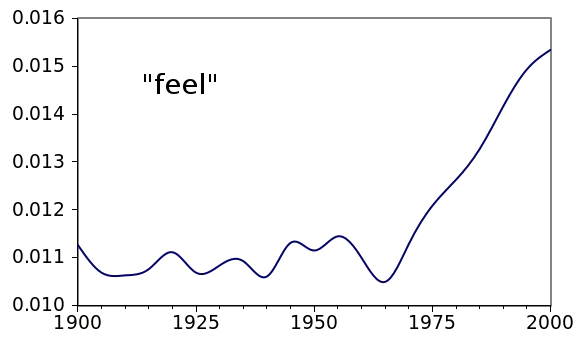
Frequency of use as a percentage of all words for feel. (Data from Google Ngram Viewer, plotted using Gnumeric.)
References:
- Jean-Baptiste Michel, Yuan Kui Shen, Aviva Presser Aiden, Adrian Veres, Matthew K. Gray, The Google Books Team, Joseph P. Pickett, Dale Hoiberg, Dan Clancy, Peter Norvig, Jon Orwant, Steven Pinker, Martin A. Nowak, and Erez Lieberman Aiden, "Quantitative Analysis of Culture Using Millions of Digitized Books," Science vol. 331, no. 6014 (January 14, 2011), pp. 176-182.
- Steve Bradt, "Oh, the humanity - Harvard, Google researchers use digitized books as a 'cultural genome'," Harvard University News Release, December 16, 2010.
- Patricia Cohen, "In 500 Billion Words, New Window on Culture," The New York Times, December 16, 2010.
- Erez Lieberman, Jean-Baptiste Michel, Joe Jackson, Tina Tang, and Martin Nowak, "Quantifying the Evolutionary Dynamics of Language," Nature, vol. 449, no. 7163 (October 11, 2007), pp. 713-716.
- Patricia M. Greenfield, "The Changing Psychology of Culture From 1800 Through 2000," Psychological Science (To Appear).
- Psychological Adaptation to Urbanization, Technology Reflected In Word Usage Over Last Two Centuries, Association for Psychological Science Press Release, August 7, 2013.
- Anna Mikulak, "Changes in language and word use reflect our shifting values, UCLA psychologist reports," UCLA Press Release, August 7, 2013.
- Tom Jacobs, "'Give' Gives Way as Word Usage Reflects Shift in Values," Pacific Standard, August 7, 2013.
Permanent Link to this article
Linked Keywords: 1960s; the sixties; counterculture of the 1960s; cultural movement; slogan; United States; hippie; paradigm; food industry; ingredient; convenience food; prepared food; cookie; propylene glycol; Upstate New York; unaccented; English language; education; educated; New York metropolitan area; secretary; coffee; television; news presenter; anchor desk; writing; written word; spoken language; spoken word; social media; blog; Google Ngram Viewer; frequency of occurrence; trend; data; converse; scientific literature; paper; University of California, Los Angeles; UCLA; psychologist; Patricia M. Greenfield; scientific journal; Psychological Science; individualism; English language; urbanization; time evolution; community; technology; low-tech; high-tech; theory; materialism; United States; 1940; 1970s; World War II; African-American Civil Rights Movement; US civil rights movement; reproducibility; comma-separated values; CVS file; Gnumeri; Spanish language; French language; Russian language; Chinese language; database; 1965.